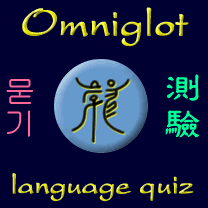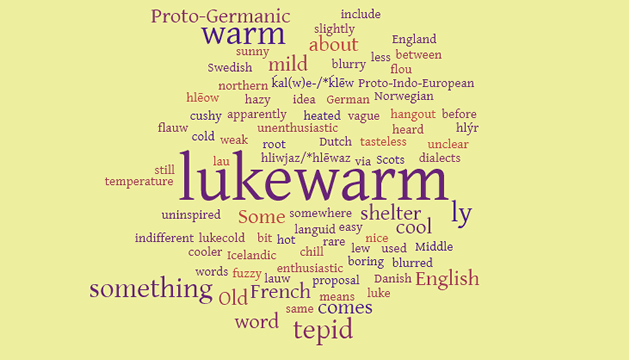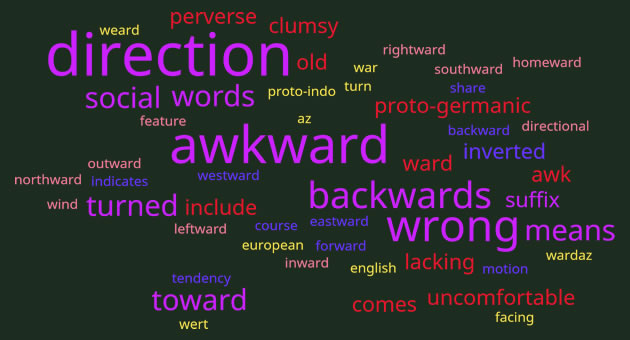
Here’s a recording in a mystery language.
Do you know or can you guess the language, and do you know where it’s spoken?

Here’s a recording in a mystery language.
Do you know or can you guess the language, and do you know where it’s spoken?
When you see a caterpillar, does it make you think of a cat or a dog?
Why do I ask? Well, the word caterpillar comes from the Late Latin words catta (cat) and pilōsa, a form of pilōsus (hairy, shaggy), via the Old Northern French word catepeluse (caterpillar). So a caterpillar is a “hairy cat” [source].
In French the word for caterpillar is chenille [ʃə.nij], which comes from the Latin canīcula (little dog) because apparently the head of a caterpillar looks like a dog [source].
In Welsh a caterpillar is a deilbryf (“insect/lava/maggot of leaves”), ymlusgyn (“little creeper”), teiliwr (blewog) (“(hairy) tailor”) or teiliwr cantroed (“tailor with hundred feet”) [source].
In Irish a caterpillar is a cruimh chabáiste (“cabbage maggot”) or a péist cháil (“cabbage/kale beast”) [source].
Are there interesting words for caterpillars in other languages?
If something is lukewarm [ˌluːkˈwɔːm / ˌlukˈwɔɹm], it is somewhere between warm and cool. Or you might be lukewarm (unenthusiastic) about an idea or proposal.

Something that is a bit cooler than lukewarm, or something that you’re less enthusiastic about is lukecold, a rare word that I hadn’t heard before.
The word luke comes from the Middle English lew (tepid), which is apparently still used in some dialects in northern England, and also in Scots, where it means lukewarm, tepid or slightly heated. That comes from the Old English hlēow (warm, sunny), from the Proto-Germanic *hliwjaz/*hlēwaz (lukewarm), from the Proto-Indo-European *ḱal(w)e-/*ḱlēw- (warm, hot).
Some words from the same Proto-Germanic root include:
Sources: Wiktionary, Dictionaries of the Scots Language /
Dictionars o the Scots Leid

Here’s a recording in a mystery language.
Do you know or can you guess the language, and do you know where it’s spoken?
Back in April 2021 I wrote a post about various milestones I’d reached, including adding the 1,500th language to Omniglot. Well, yesterday I added the 1,600th language, which seems to me like something to celebrate.
So what’s been happening since April?
Well, as well as continuing to add new material to Omniglot every day, and improving the existing content, I’ve been making Adventures in Etymology blog posts / podcasts / videos every week and posting them on YouTube, Instagram and Tiktok. They tend to get the most views on Tiktok, and I’m hoping that at least some of the people who see them there will visit other parts of the Omniglot Linguistic Universe (OLU).
In July I started making Omniglot News blog posts and podcasts which summarise all the lastest developments on Omniglot. They appear on Sundays on the Radio Omniglot site and on the Omniglot News page.
Lockdown restrictions have eased here in Wales, and we can now go to pubs, restaurants and cafés, and to concerts and other events. I go to a Welsh folk music session every other Tuesday where we speak and sing mainly in Welsh, and play Welsh tunes. There are usually people from many countries there, so I get chances to speak other languages as well. I’ve started going to a Welsh conversation group on Wednesday nights, and I regularly have opportunities to speak French and Mandarin, and often write emails in Dutch. So I’m able to practise using some of my languages.
I’ve been to a few concerts recently, include a great one this week featuring the Washboard Resonators:
In other news, the studio that’s being built in my garden is coming together. The roof should be finished in the next few days, and then they can start working other parts. I’m looking forward to using it to make recordings and videos and practise my music and singing. Hopefully the acoustics will be very good inside.
One of the Japanese words I learnt recently is オタク (otaku), which can be translated as geek, nerd or enthusiast, according to jisho, and which has been borrowed into English to mean someone who is keen on manga (漫画), anime (アニメ), etc.
It comes from an honorific form of you, お宅 (otaku), and became popular in the 1970s and 1980s as a way for fans of manga and anime to address to each other. A 1983 article by Akio Nakamori (中森明夫) in Manga Burikko (漫画ブリッコ) called Otaku no Kenkyū (おたくの研究), or Otaku Research, popularized it, and gave it a derisive and insulting meaning as the article was very critical of otaku subculture. Thanks to a serial killer in the late 80s nicknamed the Otaku Murderer, who had a large collection of anime and manga, it gained further negative connotations.
Today otaku is considered an insult in Japanese and is used to refer to people with an unhealthy obbession with anime and manga. However, it doesn’t appear to be used in this way in my Duolingo Japanese lessons, so perhaps some people are proud to call themselves otaku, like some people (including me) proudly call themselves geeks or nerds.
There are different kinds of otaku with interests in various things such as manga, travel, computers, video games, cars, anime, phones, cameras, fashion or trains. You’re most likely to spot them in the wild in Akihabara (秋葉原) and Ikebukuro (池袋) in Tokyo.
In the West otaku apparently has few if any negative connotations and is used to used by fans of Japanese, Korean and other East Asian popular culture. Some might define otaku as meaning “reclusive and potentially dangerous” while to others it means “mostly harmless and quirky”.
The word お宅 (otaku) is a honorific / respectful form of you, and also can refer to your house, home, family, husband or organization. 宅 (taku) on its own means (one’s) house, (one’s) home or one’s husband. Unusually 宅 only has one pronunciation – most Japanese kanji have two or more. The お (o) is an honorific suffix.
If you use otaku, what does it mean to you?
Sources and more information: https://www.dictionary.com/e/slang/otaku/,
https://www.merriam-webster.com/words-at-play/what-does-otaku-mean-in-japanese
https://japanyugen.com/otaku-japanese-obsessive-subculture-explained/
https://wikimili.com/en/Otaku
https://digitalworks.union.edu/cgi/viewcontent.cgi?article=1364&context=theses

Here’s a recording in a mystery language.
Do you know or can you guess the language, and do you know where it’s spoken?
The words forward, backward, eastward and westward all share the suffix -ward, which indicates a course or direction to, or motion or tendency toward.

Word cloud created with Free World Cloud Generator
-ward comes from the Old English -weard (in the direction of, toward), from Proto-Germanic *wardaz, from *warþaz (turned toward, in the direction of, facing), from the Proto-Indo-European *wert- (to turn, wind) [source].
Other directional words the feature this suffix include: inward, outward, northward, southward, leftward, rightward, homeward, seaward, landward and awkward [source].
Awkward?? What direction is that?
Awkward means:
Originally it meant “in a backwards direction” [source].
Awk is an obsolete word that means:
Awk comes from the Old Norse ǫfugr (turned backwards), from the Proto-Germanic *abuhaz (turned the wrong way, inverted; wicked, bad) [source].
Words from the same root include öfugur (reversed, inverted, backwards, wrong) in Icelandic, and äbich (inside out) in German [source].
So being awkward means you’re going backwards or heading in the wrong direction. That’s fine with me – I am a bit awkward sometimes, particularly in social interactions and situations, or you could say that I just go in my own direction.
I’ve been asked to let you know about IndyLan (Mobile Virtual Learning for Indigenous Languages), a new EU-funded app developed to promote Scots, Scottish Gaelic, Cornish, Northern Saami, Basque and Galician languages and the cultures.
It’s available on iOS and Google Play, and the developers are looking for users who speak these languages to test it. Can you help?
You can provide feedback to them on this questionnaire.
More information:
I might just try to learn some of these languages – I’ve already learnt quite a bit of Scottish Gaelic, and some Scots and Cornish, and would like to learn more.

Here’s a recording in a mystery language.
Do you know or can you guess the language, and do you know where it’s spoken?